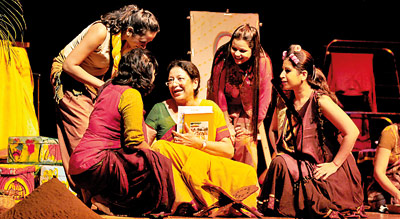Indian director Ramanjit brings everyday stories of women to local theatre- goers

A scene from the play
Since 2002, Ramanjit Kaur has been using devised theatre to reach out to people as a form of healing. What emerged as stories scribbled down during theatre therapy sessions developed over time into a full length play. Titled Baawre Mann Ke Sapne, the collection of real life stories found their way from the Indian stage to International festivals; winning awards and more recently to the Lionel Wendt in Colombo. Presented together with the SAARC Cultural Centre and the Indian Cultural Centre, the all female production found an unexpected crowd at their performance in celebration of International Women’s Day.
Under hazy red lights, the story unfolds as Amma, the matriarch of a family gets ready for a visit to England to reconnect with her estranged daughter. The 12-role cast find themselves almost always on stage as her daughters and granddaughters, helping her get ready for her big trip. As they fold clothes, cook and carry out other household tasks, each woman’s story gradually unfolds amidst chit chat and conversation.
Presented by the Creative Arts, Indian Director Ramanjit found herself looking for inspiration flipping through works by Indian short story writers. While the play did reflect much of this year’s campaign theme #PledgeForParity Ramanjit’s script managed to capture the different faces and phases of the everyday women in her ensemble ranging from the Amma; who has lived every dimension of womanhood to her young granddaughters.
Together, they provided a story which any member of the audience could relate to discussing issues of domestic violence, inequality, discrimination and sexuality. The stories also managed to weave in the significance of men and their treatment of women, not all which was cringe-worthy. In the end it echoed the importance of parenting and the effect a mother can have on raising her sons to be conscious or otherwise which often triggers a vicious cycle.
Despite the intensity of the one and a half hour insight on the issues that still plague the everyday woman, the play ended on a high if not, hopeful note, with the Director’s favourite- Amma taking a step beyond the perimeters of convention and her own preconceptions with a new-found confidence as she hugges her family one last time before making her significant journey on her own.


